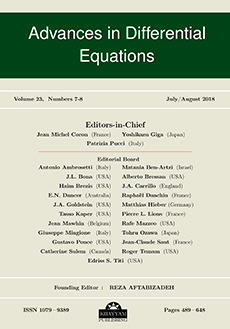Adv. Differential Equations 10 (3), 241-258, (2005) DOI: 10.57262/ade/1355867878
KEYWORDS: 49J10, 49J30, 49K10
The functional $J_{\Omega }=\frac {1}{|\Omega |}\int _{\Omega }[(\Delta u)^2-b|\nabla |^2+\psi (u)]dxdy$ is considered on bounded domains $\Omega \subset R^2$ and configurations $u$, which are functions belonging to $H^2_{loc}(R^2)$. For such $u$ the value of $J_{\Omega }(u)$ is studied in the limit where $\Omega $ extends to the whole plane $R^2$, which we denote $J(u)$. The integrand defining $J_{\Omega }$ is radially symmetric, and we raise the question whether $J(u)$ has a minimizer $u^{\star }$ which is radially symmetric, namely has the form $u^{\star }(x,y)=v(\sqrt {x^2+y^2})$. It is shown that the minimal value of $J(u)$ over the radially symmetric configurations is equal to its minimal value over 1-dimensional configurations, which are functions of the form $u(x,y)=v(x)$. Restricting to 1-dimensional configurations yields the 1-dimensional model, hence $\lambda _2\leq \lambda _1$, where $\lambda _1$ and $\lambda _2$ are the values of the 1 and 2-dimensional models respectively. Then the question which we address is whether strict inequality holds in $\lambda _2\leq \lambda _1$. We establish a sufficient condition for a configuration $u$ to satisfy $J(u)\geq \lambda _1$, and use it to conclude that the minimal value of $J(u)$ on the class of quasi-convex configurations is $\lambda _1$.

